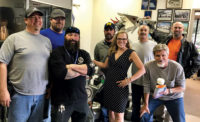While the construction industry continues to contend with the opioid crisis, Dave Argus found that offering a helping hand to recovering addicts is not only an act of compassion, it’s good business. Argus, director of operations at Karas & Karas Glass Co. in South Boston, admits he once thought addicts should be shunned, especially on jobsites. But after watching a family member battle addition, he saw them as everyday people in desperate need of help.
In 2017, Argus launched a program to help recovering addicts get back on their feet by offering training, employment and support. Since then, he’s helped dozens of recovering addicts join the trades and get their lives back on track.
Related Article:
Safety Advocates See Strength in Numbers to Combat Suicide and Substance Misuse
Back to:
25 Top Newsmakers
Argus partnered with local ironworkers, glazers and carpenters unions to provide recovering addicts a one-year probationary union membership. Participants undergo regular testing and attend support meetings. If a participant relapses, support services are available to provide inpatient or outpatient care.
Argus says while protocols are necessary, treating employees like family is the key to success.
“You have to show them the kind of care you’d like to receive yourself,” he explains. “We work nine-to-five, seven days a week together. We spend more time with each other than anyone, except maybe the people we live with. So why not treat them like family?”
Shawn Nehiley, president of the Ironworkers District Council of New England and a former addict, says compassion makes all the difference for people in recovery.
“It’s about making it a family atmosphere and not just caring about what they got done that day,” he says. “When you’re at that point [in recovery], you feel like the biggest P.O.S. in the world. You think you don’t deserve any kindness from anybody because you’re so full of shame. [Dave’s program] takes away the stigma and takes away the shame. It gives a person a chance to change the way they view themselves.”
Michael Bassett, a 48-year-old union ironworker, was one of the first people in the program, connecting with Argus through a halfway house. Bassett, who served ten years in federal prison, says not many people were willing to take a chance on him. Today, he owns a home, has a new truck and a fiancée. “I consider Local 7 [Ironworkers] and Karas and Karas part of my family,” he says. “I take pride in what I do here.”
In addressing the opioid crisis, Argus says companies fail in combating addiction issues by largely seeing recovering addicts as nothing more than “risks.” He says the greater risk is not offering help and perhaps losing people to addiction forever. In fact, he notes that by instituting a culture of caring, overall safety improves. Between when he first started the program in 2017 and 2020, the company’s experience modification rating dropped to 0.8 from 1.0.
“When you help people put their lives back together, they can end up being the best employees you have,” Nehiley adds. “They are hardworking, honest and want to do the right thing.”





Post a comment to this article
Report Abusive Comment